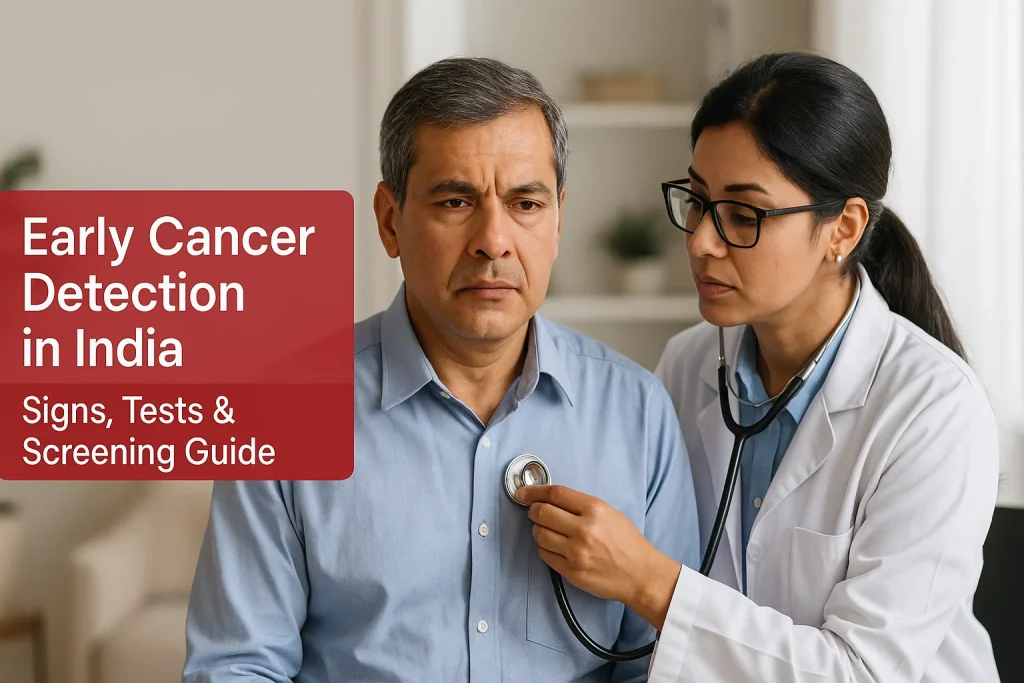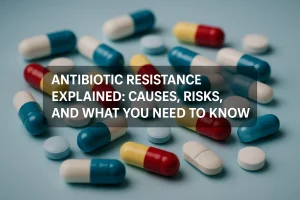
Early Cancer Detection in India: Signs, Tests & Screening Guide
Early detection is one of the most effective ways to improve survival rates and treatment outcomes for people at risk of cancer. In India, increased public awareness and better access to cancer screening have encouraged more individuals to take proactive steps toward their health. Recognizing early signs of cancer, staying informed about recommended diagnostic tests, and scheduling regular health checkups can greatly increase the chances of a timely diagnosis and successful treatment.
In this article, we’ll discuss how to recognize early cancer symptoms, the critical role of early diagnosis, and where to find trustworthy cancer screening and support centers throughout India.
Why Early Cancer Detection Matters
Early detection of cancer significantly improves survival rates because cancers detected early can be effectively treated and prevented from spreading to other parts of the body. The Indian Council of Medical Research (ICMR) believes that timely diagnosis could save thousands of lives in India each year.
The most common types of cancer in India are
1. Breast Cancer
- A feeling of a Lump in the breast or armpit
- Changes in breast size, shape, or skin darkening
- Nipple discharge or inversion
2. Cervical Cancer
- Abnormal vaginal bleeding
- Unusual vaginal discharge
- Pelvic pain
3. Oral Cancer
- Persistent mouth ulcers
- White or red patches in the mouth
- Difficulty swallowing or speaking
4. Lung Cancer
- Persistent cough
- Blood in sputum (in small amounts)
- Shortness of breath or chest pain
5. Colorectal Cancer
- Changes in bowel habits
- Blood in stool
- Unexplained weight loss
Who is at Risk?
- A person with bad habits like Smoking and drinking
- A person with a sedentary Lifestyle and a poor diet
- Family history of Cancer
- Exposure to Harmful Radiation and Carcinogens (Cancer-causing agents)
- Age
What are the cancer screening tests in India?
Different types of blood and imaging tests are available to detect cancer in the early stages. However, consult your doctor for a personalized treatment plan before undergoing any tests. They can recommend the most appropriate diagnostic approach based on your condition.
Blood Test for Cancer Screening
1. Complete Blood Count (CBC) test: It measures the number and types of blood cells. Abnormal counts or immature cells may indicate blood-related cancers. It can detect blood cancers like leukemia.
2. PSA Test (Prostate-Specific Antigen): This test screens for high levels of PSA in the blood, which could suggest prostate cancer or a benign prostate issue. Men over 50 or those with a family history are often advised to take this test.
3. CA-125 Test: This test detects high levels of CA-125 in women, especially in postmenopausal women, which can be an early indicator of ovarian cancer.
4. Alpha-Fetoprotein (AFP) Test: This test checks for high AFP levels in adults, which may point to liver cancer or germ cell tumors (testicular cancer).
5. CEA Test (Carcinoembryonic Antigen): It helps in monitoring the response to cancer treatment. Recommended for colorectal, breast, and lung cancer.
6. CA 19-9 Test: This test helps screen for pancreatic and gastrointestinal cancer. The CA 19-9 test is often used alongside imaging studies to confirm a diagnosis.
7. HPV DNA & Pap Smear (for Cervical Cancer): The Pap test screens for abnormal cervical cells, while the HPV test detects high-risk virus strains that can cause cancer. It helps in the early detection of cervical cancer in women.
Note: Blood tests alone are not always definitive. They are often used with imaging tests or follow-up evaluations to confirm a diagnosis.
Imaging Tests for Cancer Screening
Imaging tests help doctors see what’s happening inside your body. They are particularly useful for detecting tumors, unusual growths, or organ abnormalities.
1. Mammography: It is a low-dose X-ray technique to screen for breast cancer that can detect lumps or changes in breast tissue even before they are felt. Recommended for women above 40.
2. Low-Dose CT Scan (LDCT): A CT scan, HRCT chest (high resolution), and NCCT chest (non-contrast) can provide detailed images of the lungs and can detect small tumors. It can be useful for the early detection of lung cancer in smokers or high-risk individuals
3. Ultrasound: It is a safe, radiation-free test that uses sound waves to detect tumors or abnormalities in soft tissues. Can screen early for abdominal, pelvic, and breast cancers.
4. Colonoscopy or Sigmoidoscopy: A specialized camera is used to examine the colon for polyps, bleeding, or cancer. Advised for adults over 50. Used for colorectal cancer screening.
5. Chest X-ray: It uses the X-ray beam, which, when it penetrates, can reveal large tumors, providing Basic screening for lung abnormalities
6. MRI/CT Scan: It uses a magnetic field that provides detailed cross-sectional images. Not typically for routine screening, but useful for high-risk cases like brain, spinal, abdominal, and pelvic cancer.
7. PET-CT Scan: An advanced imaging technique that helps determine how far cancer has spread. Generally referred to after diagnosis for whole-body detection and cancer staging, not as a first-line screening test.
Where to Get Screened in India?
In India, you can go for cancer Screening at
- Government hospitals (AIIMS, Tata Memorial)
- Private hospitals and diagnostic labs (Apollo, Fortis, SRL, Metropolis)
Specialized clinics like Denvax Clinic (offering immunotherapy and consultations) - Health camps and NGOs (free or subsidized tests under schemes like Ayushman Bharat)
A final thought:
Cancer can be detected early with the help of different blood and imaging tests. Regular cancer screening can help catch the disease before symptoms even appear. If you’re at risk due to age, genetics, or lifestyle, consult your doctor about the right screening schedule and be aware of it.
FAQs
Which early cancer symptoms should one look out for in India?
Unusual bleeding, non-healing wounds, abnormal lumps, persistent coughing, changes in bowel habits, and unexplained weight loss are common early indicators. Always get medical advice if your symptoms don’t go away.
Which cancer screening tests are available in India?
Mammograms for breast cancer, Pap smears and HPV tests for cervical cancer, visual inspection for oral cancer, colonoscopies for colorectal cancer, and low-dose CT scans for high-risk individuals are all available for screening in India.
When should I start getting screened for cancer in India?
Depending on the type of cancer and personal risk factors like gender, lifestyle, and family history, screening usually begins between the ages of 30 and 40. Consult your doctor for a personalized plan.
Is early cancer detection covered under health insurance in India?
Cancer screenings and preventive health examinations are now often covered by health insurance policies. Consult your provider for more details.
Where can I go for affordable cancer screening in India?
Government hospitals, cancer non-governmental organizations, mobile health camps, and some private diagnostic centers in major Indian cities and rural areas offer screening at affordable prices.
- Gastroenteritis: Causes, Symptoms, Prevention & Treatment Guide
- 10 Best Foods to Eat During Chemotherapy to Boost Strength & Speed Recovery







